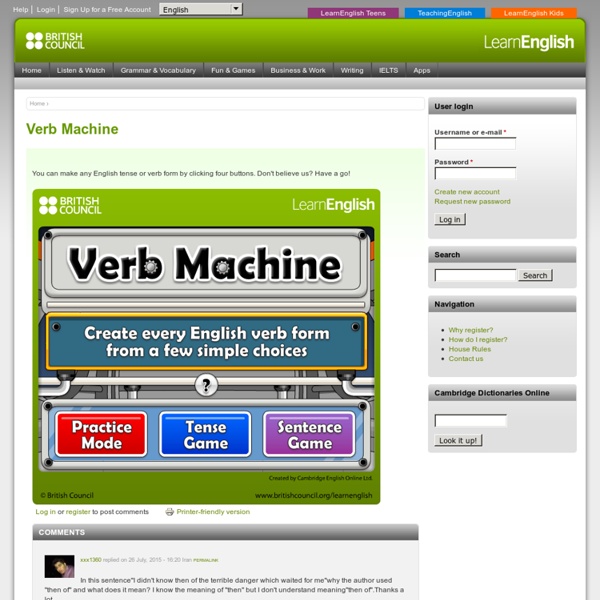



http://learnenglish.britishcouncil.org/en/word-games/verb-machine
Related: english • grammarAdverbs of frequency Teaching adverbs of frequency has to consist of several steps. First, the students have to learn the words. If they do not know the words it is useless to teach them the grammar. Once you are sure that the students know the adverbs you have to teach them where they should place them in a sentence. Irregular verbs again I have already published several posts on irregular verbs: Past participles – divided according to the pronunciation and Present perfect tense. However, a week ago a student of mine contacted me and asked me if I could create a way for him to learn the irregular verbs. He spends a lot of time driving so he asked me to prepare something to listen to in his car. So I did. In this post there are 33 irregular verbs presented in an associative matrix, in mp3 for listening, in mp3 for learning and two games for practising them.
12 Puzzle and Quiz Creation Tools for Teachers There are many different sites on the internet that allow you to create your own puzzles and games to use either directly in class, or which can be linked to/embedded into your VLE. I’ve been doing some trawling ahead of a training session I am running soon, and here are a few of the best ones that I’ve found. There are others out there, but the focus specifically for my session was KS4 and 5, so these links are aimed at older students.
Give a title to our Poem...- Plant a Question, Grow Answers! Generate a live word cloud with your audience. collaborative dreamslove and peacetogetherwe are europewe can do everythingwe make europe a better placehappy faces hopesunityhappy faces smiling all togethercolaborativveour happiness poemhope!weus together!!a happy worldthe butterfly poemwe are powerjoined in poetrywe are creative teachers! Happy English Podcast Learn English Podcast: Play in new window | Download Subscribe: iTunes | I drove to Boston last weekend. Photo Credit: Stephen R. Pellerine Photography on Facebook & Instagram
Fun 1st Conditional Practice Stimulating ways of practising “If + Present Simple, Will” sentences in the classroom. There are so many fun things that you can do with the first conditional that there is a danger of spending far too much time on it, so please read through the list below and select a couple rather than working your way through them! 1. Crossword Puzzles Download the plug-in tools you need to use our games and tools, or check to see if you've got the latest version. Learn more Looking for ways to engage your students in online literacy learning? Find more interactive tools that help them accomplish a variety of goals-from organizing their thoughts to learning about language. More Irregular Verbs — Exercise 1 Directions: In the exercise that follows, you will read sentences that contain blanks. These blanks require the appropriate forms of irregular verbs. To keep track of your answers, print the accompanying handout. If you are unsure which choice to make, consult the rules. Disclaimer: All prizes in this exercise are cyber, which means they have no physical reality and cannot be collected for use in the material world.
36 fun classroom activities for Present Simple and Continuous By: Alex Case |Audience: Teachers|Category: Teaching English I have recently published 56 communicative activities to teach Present Simple and 35 for practising Present Continuous, often combined with things like frequency expressions and pronunciation to make lessons on these rather basic tenses more useful. However, the most useful thing you can do with Present Simple and Present Continuous is teach and practise them together, contrasting their meanings and uses. I therefore recommend moving fairly quickly on from any lessons on those tenses on their own to combining them in the ways explained below. As many of the activities below are variations on activities in my articles on teaching Present Simple or Present Continuous on their own, one easy way into teaching both tenses together is by adding one extra tense to an activity halfway through it.
The Simple Logical Puzzle That Shows How Illogical People Are In the 1960s, the English psychologist Peter Wason devised an experiment that would revolutionize his field. This clever puzzle, known as the “Wason selection task,” is often claimed to be “the single most investigated experimental paradigm in the psychology of reasoning,” in the words of one textbook author. Wason was a funny and clever man and an idiosyncratic thinker. American English Pronunciation Podcasts Listen now! Note: The most current podcast will begin playing, scroll down to the episode you wish to listen to. Other Stuff at Pronuncian